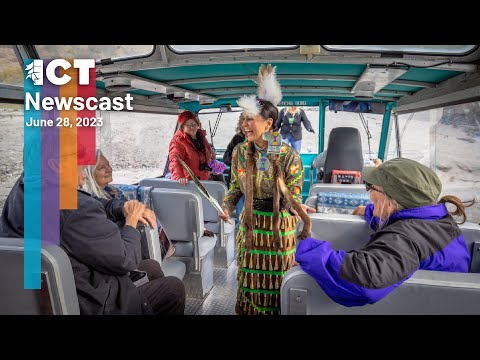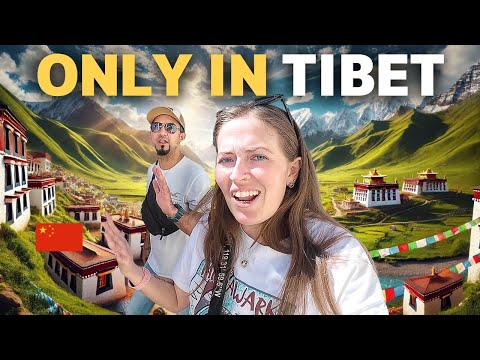Tribes embrace tourism

>> Coming up, the CEO of a tribal tourism association gives us a breakdown of the industry. Plus what does tribal self-determination mean for language revitalization? And, the Supreme Court disappoints the Navajo Nation and water rights activists. I'm McKenzie Allen-Charmley.
Join us for those interviews plus headlines from the ICT newscast. >> This program is made possible by the Corporation for Public Broadcasting, a private corporation funded by the American people. >> Arizona State University welcomes 3,500 Indigenous students from Arizona and across the nation.
It serves one of the largest populations of Indigenous students among U.S. colleges and universities. We created a sense of place for tribal nations to create futures of their own making, through community outreach and research, taught by world-class Indigenous faculty, where they see a reflection of themselves and their experiences. Find community at ASU. [ music ] >> Chin'an gheli! We're so glad you could join us.
We start in the Pacific Northwest, where two more tribes in Oregon have struck a historic fish and wildlife management deal with the state. The Confederated Tribes of Siletz Indians and the Confederated Tribes of the Coos, Lower Umpqua, and Siuslaw Indians can now issue permits for tribal citizens to hunt, fish, trap and gather under tribal licenses with this new agreement. It also allows the state and tribes to pool finances on restoration projects and bring Indigenous values and knowledge to the process. Two other tribes, the Cow Creek Band of Umpqua Tribe of Indians and the Ko-Kwel Indian Tribe previously entered into deals with the state. Tribal officials told ICT this is progress. >> There's a lot of different ways that this is gonna benefit both the state and us.
Um, first of all, I mean, you can talk about financial. Um, the tribe has access to grants that the state may not. Also, uh, working together as partners, we can bring our knowledge together with the state and-and work on different ways to help our environments. >> State officials say they hope to craft wildlife management partnerships with all nine federally recognized tribes in Oregon.
Now to Minnesota, where the US Justice Department has released the findings of a two-year report into policing. It alleges the Minneapolis Police Department and the city systematically discriminated against racial minorities, including Black and Native American people, as well as those with behavioral health disabilities. The investigation was first launched in April 2021 after former officer Derrick Chauvin was convicted of murdering George Floyd. Among the data points, it found that Native American drivers are 7.9 times more likely to be pulled over than white people.
The investigation was based on document reviews, body camera videos, data provided by the city and police, and conversations with officers and residents. It also found that police used dangerous techniques and weapons against people who committed petty offenses and sometimes no offense at all. US Attorney General Merrick Garland said at a news conference the city and police department have agreed to a consent decree, which will require reforms overseen by a federal judge. For the first time in history, Indigenous people will formally be part of the FIFA men's World Cup soccer festivities. Seattle, Washington is one of 16 host cities for the tournament spanning across Canada, the U.S., and Mexico in 2026.
The city's planning committee Seattle FWC '26 announced the Puyallup Tribe of Indians is the official legacy supporter for all Seattle-based World Cup activities. FIFA will hold all of Seattle's World Cup matches at Lumen Field, which is on the ancestral land of Duwamish people. "Soccer is the international instrument to bring people together in a good way and for us to have a piece of that is really an honor," said Puyallup Tribal Council Chairman Bill Sterud. This collaboration is the first of ten involvement entities the committee is focused on to create a legacy of culture, community, and inspired youth. The Puyallup Tribe is a federally recognized sovereign nation of more than 5,000 members. Initiatives like this will provide the Tribe the opportunity to share their story, in their own voice, on a global stage.
A new documentary is looking at how boarding school and adoption policies affect the children and grandchildren of those who were taken. A new episode of the PBS docu-series "Generations Stolen" focuses on the forced assimilation of Native children in the US and Canada, highlighting the generations who came after. First at boarding schools, and now in non-Native adoptive and foster homes, Indigenous communities continue to fight to protect their children.
And though June's rejected challenges to ICWA could be seen as a win, working to overcome generations of trauma is just beginning. In the 1960's, Rebecca Black's mother was taken from her Tribe in Canada in what is known as The 60's Scoop Era. Black's daughter Amanda Chavira spoke to ICT and said it was important for her to show that this is not history, it is an on-going crisis.
>> I definitely think that it's something that the broader, um, society needs to see. Because it is definitely-- we get stamped as these, like, old Indian people from back in the day, or they might be familiar with boarding schools and they only see the Carlisle black and white footage. And that's not it.
It's still happening today. So that was why it was important for me to be a part of this documentary. >> The episode with Rebecca and Amanda's story is now available to stream on the PBS app.
We turn now to men's lacrosse, where the Haudenosaunee Nationals are competing on the sport's biggest stage. The 2023 world lacrosse men's championships are underway in San Diego, California. Among the 30 teams from countries like France, Japan, and Korea, the Haudenosaunee Nationals are competing for a gold medal. The team finished pool play earlier this week with wins over Australia and England.
On Tuesday night, the Nationals clinched its spot in the quarter finals after leading Hong Kong, China 13-3. Next up, the team plays Japan, and if they win, will secure their place in the gold medal match. Hundreds of years ago, the sport of lacrosse was created by the Haudenosaunee and has been embraced as a medicine game. You can watch games on ESPN+ through the championship on Saturday, July 1st. And those are the headlines for the ICT Newscast.
>> The American Indian Alaska Native Tourism Association was established for Tribes to address inequities in the tourism system. The association provides assistance training, research and publications to communities engaged in tourism and hospitality. Joining us now is CEO of the association, Sherry L Rupert.
She has spearheaded several initiatives including the organization's groundbreaking new Tribal Agritourism program and Native Arts Initiative. Welcome, Sherry. >> Thank you, thanks for having me. >> To start, can you tell our viewers more on how the association was founded? >> Sure, um, actually, it was a group of-- it was a grassroots effort, uh, a group of Native people coming together and just, uh, being aware that, um, you know, we've been welcoming visitors for hundreds of years, and there is this tourism industry that isn't inclusive of Native people, and, um, and the amazing experiences and-and products that we have. And so, um, they started out with the American Indian Tourism Conference, uh, and, uh, that grew into, uh, the American Indian Alaska Native Tourism Association. >> We touched on this a little bit earlier, but can you expand on what the association offers? >> Sure, uh, we're a-a Native-led, uh, Native non-profit, the only one in the country, uh, established to, uh, to grow tourism-- cultural tourism in our American Indian Alaska Native and Native Hawaiian communities.
So, um, not only do we provide technical assistance and training, uh, but we develop and implement programs to provide economic development opportunities, uh, for those communities. So that way they can, uh, build-build for their futures, help-help to sustain, um, their communities. >> Can you expand more on what the Tribal Agritourism program is? >> Sure, um, you know, we have, uh, ranchers, farmers and fishers out in our communities, and, uh, many-- and-and many Tribes across the nation as well that, um, are-- have looked at food sovereignty and the wellness of their people. And so, they started out in that way of, um, you know, producing, uh, foods for their people, uh, to bring wellness back, uh, to their citizenry, and they've also discovered that, um, they can, um, package that up and they can, um, sell that, uh, to-to others that are interested.
And, uh, so they've, um, come up with different events, uh, where they can, um, sell their products. They've come up with, um, tours. Um, you know, people love to come and experience the-the farm life or the ranching life, and they'll actually pay to come out and harvest. And-and I know that you've seen these along the highways and things like that across the nation where you can pull up and pick your own strawberries or pick your own blueberries, um, that type of thing.
And then I've seen up in the Pacific Northwest as well, uh, where, uh, they'll fish off of the Columbia River, and bring that fresh fish up, uh, for people, um, to-to purchase. And, uh, so it's a really-- it's a really healthy way of-of eating and, um, also sharing that with-with others. >> What upcoming events or initiatives do you have planned? >> Well, we're-- we've talked about the, um-- agro-tourism. But we're working on a Native arts initiative as well. We received an NEA grant to work with our Native artists across the nation to really help them to develop their businesses, teaching them how to market themselves and how to do online sales. And so that's been really popular, because as you know, a huge part of our communities are our Native artists.
And I know when I go to the communities, one of the things that I look for are authentic Native art from that area to purchase. And you know, I'm wearing some of that today. And I think it's so important for us to help our Native artists to develop their businesses, and also to help market their amazing creativity through their art. >> You worked with Congress to pass the Native American Tourism and Improving Visitor Experience Act, also known as the NATIVE Act. Can you tell us more about that and its significance? >> Sure, so I mentioned that AIANTA was really birthed out of a grassroots effort and through our evolution we've, you know, come to realize that the tourism industry in this country isn't set up for tribes to succeed. There's a lot of infrastructure out there, and it's mostly funded by room tax funds.
And you know, many of our tribal communities don't have lodging establishments. Some do. But predominantly not, especially the ones in the very rural areas.
And so when you're not paying to play, when you're not putting into that system, they don't necessarily want to market you. And so the NATIVE Act really was about bringing some equity for tribes, tribal organizations, and Native Hawaiian organizations to the industry. And so we, you know, began working on that in 2014. And you know, walking the halls of Congress and just educating them on cultural tourism and its importance and the importance for this bill. So the bill was all about bringing that equity, getting the tribes to the table as far as potential funding sources from those federal agencies that have tourism authority and lots of money that can be used toward cultural tourism.
>> Sherry Rupert, thank you so much for joining us today. >> Thank you. >> Leslie Harper is determined to help tribal communities create their own futures. Raised by parents who instilled the values of sovereignty and self determination, she believes that priorities and decisions must be determined from within a community, not from an outside entity.
As a recipient of a Bush Fellowship, she will work to revitalize the Ojibwe language. Welcome, Leslie, and congratulations. >> Miigwech. Thanks for inviting me today. And thanks for that introduction.
>> Of course. Tell us, what are your plans for your fellowship? >> I will be taking some time, stepping back a bit from a little bit of work and taking some time to develop some really specific skills on mobilization, organizing, you know, challenging community conversations so that I can continue to work with communities on language revitalization. And then also I'm going to visit multiple Native American language and Indigenous language revitalization sites, both here in the US, but also some international sites. >> How do values of sovereignty and self determination weigh in within your work? >> So a lot of folks say Leslie Harper, she's a Native language revitalizer, which I am. I am very, very-- I've spent half my life in Native American language revitalization. And we know that our languages underlie every piece of our citizenship, every piece of our humanity.
And so starting out in language revitalization, I also got involved in public policy, 'cause there are numerous policies, um, in this country and globally that impact us as Native people and have prohibited and suppressed our languages. So, when I say our decisions and our determinations are best identified by us, it really is a response to these suppressive policies that have been put upon our communities for centuries now. But it's also really important to know our languages to undergird our legal rights. If the treaties are to be interpreted in the way that, you know, they should be understood at the time of the negotiation, it's gonna be really important to understand our Native languages and to be able to understand what those interpretations are to support our legal rights. Our environmental rights, um, our ecological, um, knowledge is being created and shared are really informed.
Um, for us as Ojibwe, by place names. They have really sophisticated understandings of geographic and geologic features. So that can help our environmental laws and ordinances as a tribe, um, instead of being these, you know, externally placed ideas, um, we can get back. And we say, you know, a lot of these American policy ideas that have been pushed on us haven't been working really well for our people. So, for us to come back to ourselves through our languages and our interactions is a really important piece of how we create our futures and our futures as citizens. >> What are some of the obstacles that your tribe faces in teaching language and culture to children? >> Um, capacity issues, which can break down to, um, you know, we have a small population from which to draw to create new teachers, um, or time to create new speakers of a language.
It can take thousands and thousands of hours of instruction to learn our languages to a really high level of proficiency. To be able to talk about multiple different subjects that would normally come up in life. Um, but also, um, community and home life language speaking.
Being able to transmit that intergenerationally in a natural way. Trying to re-normalize what does that mean to pass on our language to our kids normally once again instead of having to be external classes. What does it really take to bring a parent generation into using our language all day, every day. What does it mean-- what will it take to bring a grandparent generation safely back to speaking our languages.
Um, where they may have been pressured to not do so previously. What does it mean? What do-- What do our languages sound like in children's voices? For me, as an Ojibwe person from Leech Lake, um, that has not been a common occurrence for many, many, many decades. Um, so... bringing the language out in all of those ways is a really important endeavor and it really involves everyone.
So, when we talk about teaching language, we really don't mean it's just boxed in, in a class. It really-- we need to look at bringing ourselves back out onto the land where our language is connected, um, back into connection with people of varying generations, um, and into new domains. I say "new domains". Um, into new places instead of it just being in a class in a school.
Or just being over at, um, a weekend event. This should be every day, everywhere we go. In our stores. And we've seen a lot of different areas are starting to put signage in, you know, tribally-owned grocery stores, um, a border town has started a language project in which they are using, you know, signage. Which again, comes to normalizing our language as communication.
>> Well, Leslie Harper, thank you so much. >> Miigwech. >> The U.S. Supreme Court said the United States is not required to take affirmative steps to secure water for the tribe.
That protection is not explicitly stated in the Navajo Treaty of 1868, according to its ruling in a 5-4 vote in Arizona v. Navajo Nation. Here to talk more about that is ICT regular contributor, Holly Cook Macarro. She's the founding principal and president of The Angle. She's a board member of Indij Public media, the company -- parent company that owns ICT and the ICT Newscast. Welcome back, Holly. >> Good morning, how are you? >> I'm doing well.
So, 5-4 isn't an overwhelming decision. But what does that mean for the Navajo Nation in the Colorado River Basin? >> Well, for the Navajo Nation, I think, it sets them back in terms of the quantification of the water and the role of the federal government in-in securing those water rights. There is, um, you know, a very defined -- an esoteric area of federal Indian law.
I lobbied a water settlement through, um, several years ago. And, um, the -- there's a federal team that's usually appointed. It also puts the federal government in that old, uh, odd position of being both negotiating with the tribe and then being on the same side of the table to advocate for the legislation that is required to pass Indian water rights settlements. Now, with the Navajo Nation, uh, they really have, um-- or they've indicated that they are going to continue to advocate and negotiate for their water rights.
But what they won't have is that foundation of the obligation of the federal government to quantify those water rights, um, and really play that role in-in ensuring that the tribe, uh, is-is-- secures the water rights that, um, that the tribe needs, both now and into the future. So, it-- I think, you know, puts them in a more difficult position in their negotiation with the state and other water users. >> There's a long-held principle called The Winters Doctrine that, in essence, guarantees water for tribes. How does this decision impact that? >> Well, it-it weakens it to some-to some degree again. The Winters Doctrine is really the legal foundation for tribes, um, and their -- and the-the commodification of their water rights. The Winters Doctrine says that tribes have, um, have senior rights to water, because a tribal water right is established when a reservation is created.
And so the way access to water works is you get in line, uh, w-when you need that water. So, tribes, in most cases, the reservations were created, um, prior to other users, um, coming online. So, that senior water right is, I think, largely untouched by this decision. But, what it doesn't do is, um, go beyond that and say that the federal government has a right to actively help secure and quantify those water rights. >> I understand that this case was the third and final federal Indian law case this term. What's the long term implications of these decisions? >> Huge.
W-what a year for Indian Country in the Supreme Court, right? We've had, um -- well, there were four. One was remanded in-in Oklahoma v. Sims. Um, and that was a-a case regarding jurisdiction over non-Indians which, um, remanded back down, in light of the Huerta.
So, but, you know, I don't think any of us are gonna stop talking about the decision in, uh, Haaland v. Brackeen and the huge win with the protection of the Indian Child Welfare Act. That is going to protect us and impact us for generations. Now, a-a lower profile, uh, case in there was the application of the bankruptcy code, uh, for tribes.
And, um, and then, as we just talked about, the Arizona v. Navajo Nation, which has far-reaching implications beyond -- beyond the Navajo Nation. There are seven states that are on the Colorado River. T-The water, given the drought, this extended drought that, um, we've had in the West, there's going to be, um, a lot of people looking at-at, um, how water is-is divided up on the Colorado River. It's really a zero sum game there. There's just not enough water in the West.
So, those implications are huge, in and out of Indian Country. Overall, I think this term was far better than we could've hoped for, uh, particularly because of the broad, broad impacts of the Indian Child Welfare Act, beyond even the Act itself. >> Well, Holly Cook Macarro, thank you so much for joining us. >> Yes, thank you. >> And that's a slice of our Indigenous world.
For all the latest visit ICTNews.org. From all of us in the newsroom, stay safe, my relatives. [ music ] >> This program is made possible by the Corporation for Public Broadcasting, a private corporation funded by the American people.
2023-07-03 23:38


